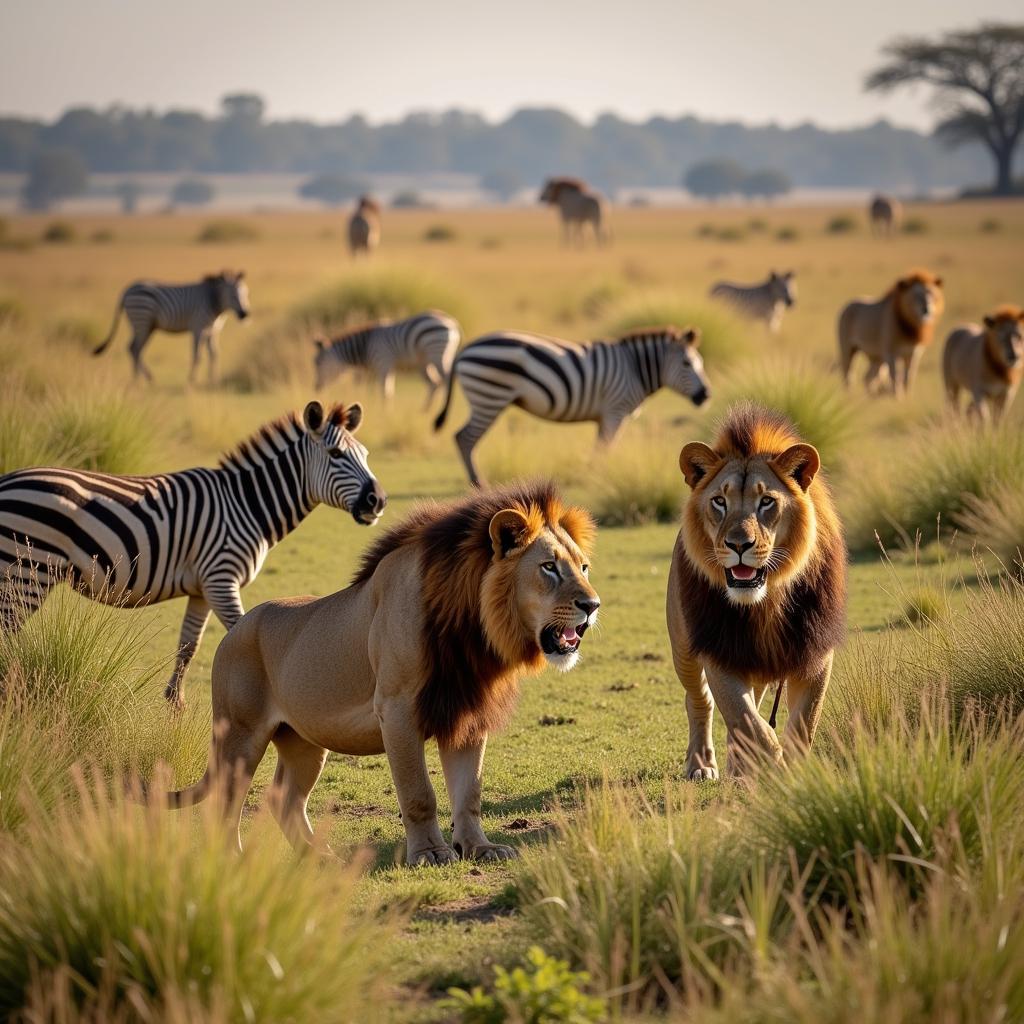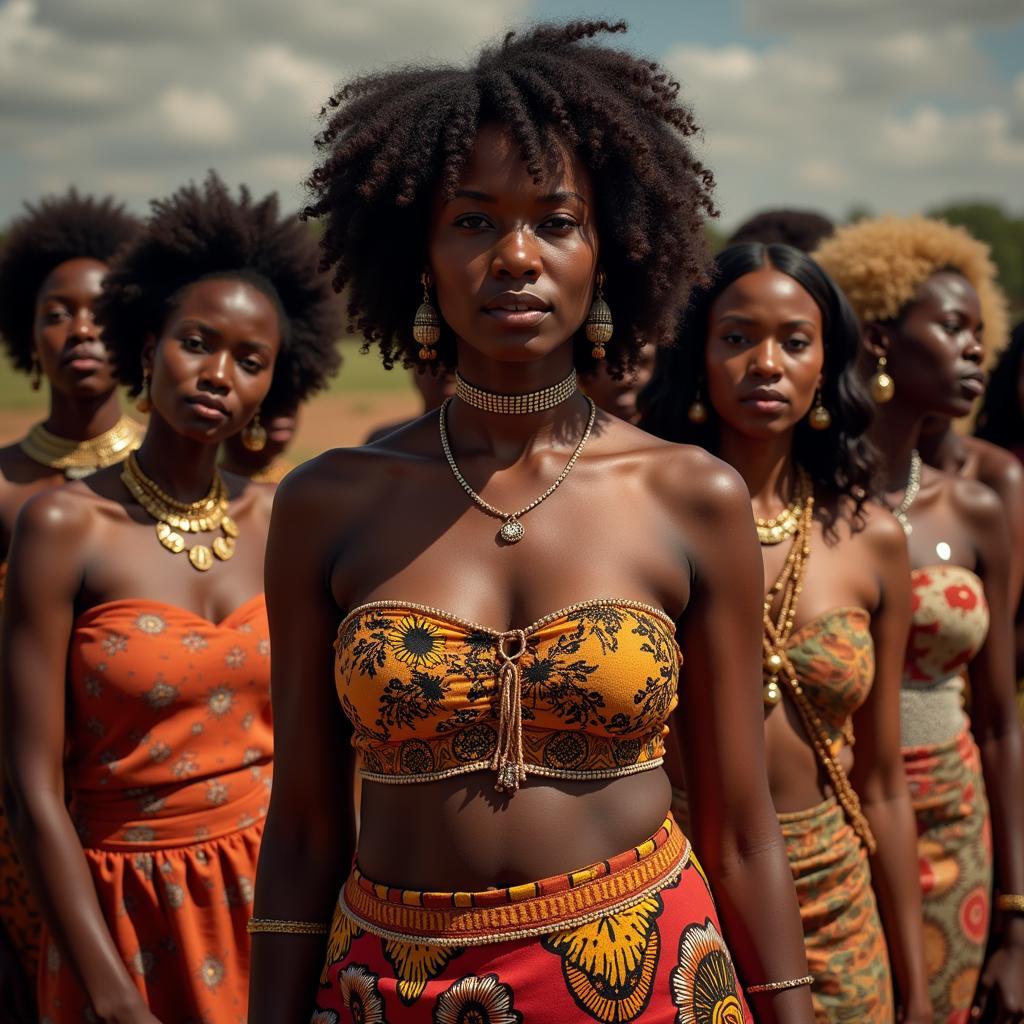Majestic Black African Lion: King of the Savannah
The Black African Lion, a creature of myth and majesty, reigns supreme in the African savanna. Often shrouded in mystery, these magnificent predators embody power and grace, capturing the imagination of people worldwide. This article delves into the fascinating world of the black African lion, exploring their behavior, habitat, and the challenges they face in the modern world. We will also examine the myths surrounding “black” lions and uncover the truth behind their coloration.
Understanding the Black African Lion Myth
While the term “black African lion” evokes images of a panther-like creature with dark fur, true black lions do not exist. The term is often used to describe lions with darker than usual manes, a trait caused by genetic variations and environmental factors. These dark-maned lions, while impressive, are not a separate subspecies. Their majestic appearance, however, has fueled legends and stories across Africa. You might also be interested in other African animals with horns pictures.
What causes the darker mane? Higher levels of testosterone contribute to mane darkness and density. Lions in cooler climates, like mountainous regions, tend to have darker manes. These darker manes may offer an advantage in attracting mates, as they signal strength and virility.
The Role of Melanism
Melanism, a condition that results in increased dark pigmentation, is often cited as a possible explanation for “black lions.” While melanism occurs in other big cats, like leopards and jaguars, confirmed cases in lions are extremely rare and often disputed. Most sightings of supposedly “black lions” are attributed to lighting conditions or photographic manipulation.
Habitat and Behavior of African Lions
African lions are highly social animals, living in prides typically consisting of related females, their offspring, and a coalition of males. These prides roam territories that can span hundreds of square kilometers, defending their hunting grounds from rivals. Lions are apex predators, playing a crucial role in maintaining the balance of the African ecosystem. Their prey includes large herbivores like zebras, wildebeest, and buffalo.
Are African lions nocturnal? While they can be active at any time of day, lions are primarily crepuscular, meaning they are most active during dawn and dusk. These times offer cooler temperatures and better hunting opportunities.
Social Dynamics within a Pride
The social structure of a lion pride is complex and fascinating. Female lions are the core of the pride, responsible for hunting and raising cubs. Male lions protect the pride’s territory and siring offspring. Competition between males for dominance can be fierce, often resulting in violent confrontations.
 African Lion Pride Hunting
African Lion Pride Hunting
Conservation Challenges
Sadly, the black African lion, like all African lions, faces numerous threats. Habitat loss due to human encroachment, poaching, and human-wildlife conflict are putting immense pressure on lion populations. Conservation efforts are crucial to ensure the survival of these magnificent creatures for future generations. You might be interested to know about certain African food products that are sustainably sourced and contribute to conservation efforts.
What are the main threats? Habitat loss is a significant threat, as human populations expand and agricultural land increases. This reduces the available space for lions and their prey. Poaching for trophies and body parts also poses a serious threat.
Protecting the Future of the King
Protecting the black African lion, and indeed all African lions, requires a multifaceted approach. This includes establishing protected areas, combating poaching, and promoting sustainable tourism. Educating local communities about the importance of lion conservation is also essential. Learn some fascinating African apartheid facts which sheds light on historical land disputes and its impacts.
Conclusion
The black African lion, while a product of myth and legend, symbolizes the power and beauty of these apex predators. Understanding their true nature, the challenges they face, and the importance of their conservation is vital to ensuring their continued reign as kings of the African savanna. The magnificent dark-maned lions, often referred to as “black” lions, remind us of the incredible diversity and wonder of the natural world. There’s another interesting creature, the African Dwarf Dog, which is less known but equally fascinating.
FAQ
- Do black African lions really exist? No, true black lions are not a recognized subspecies. The term is used to describe lions with darker manes.
- What causes the dark mane in some lions? Genetics, higher testosterone levels, and cooler climates contribute to darker manes.
- What do African lions eat? African lions are apex predators, feeding on large herbivores like zebras, wildebeest, and buffalo.
- Are African lions endangered? African lions are classified as vulnerable, facing threats from habitat loss, poaching, and human-wildlife conflict.
- What can be done to protect African lions? Conservation efforts include establishing protected areas, combating poaching, and promoting sustainable tourism.
- How big are African cichlids? You can learn more about the size variations of African cichlids big.
- What is the social structure of a lion pride? Lion prides consist of related females, their offspring, and a coalition of males.
Common Scenarios and Questions:
-
Scenario: You’re on safari and see a lion with a very dark mane. Is this a black lion?
-
Answer: No, it’s a lion with a dark mane due to genetic and environmental factors.
-
Scenario: I saw a picture online of a completely black lion. Is this real?
-
Answer: It’s highly unlikely. Confirmed cases of melanism in lions are extremely rare. The image is likely a result of lighting conditions or photo manipulation.
Further Exploration
You might also be interested in learning more about African wildlife photography or the impact of climate change on African lion populations.
When you need assistance, please contact Phone Number: +255768904061, Email: kaka.mag@gmail.com Or visit: Mbarali DC Mawindi, Kangaga, Tanzania. We have a 24/7 customer care team.

